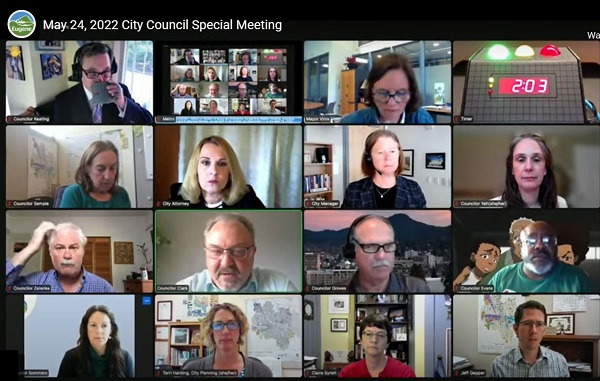Council unanimously approves land use code changes for middle housing
4 min read
Strike the word ‘Proposed’, add the word ‘Adopted.’ The Eugene City Council adopts changes to the land use code, making it easier to build a wider variety of housing types. At a special session May 24, Mayor Lucy Vinis.
[00:00:14] Mayor Lucy Vinis: And as I stated that I would do on May 18th, I will first call on Councilor Clark so that he can make his motion to amend the ordinance. So with that, Mike, you have the chair.
[00:00:27] Councilor Mike Clark: I move to amend maximum lot coverage for lots with duplexes, triplexes, and fourplexes, change the R1 maximum lot coverage from 75 percent to 50 percent. (Second.) All along I thought the wise course of action was to adopt the minimum standards, and then for us to have the scheduled and planned work sessions on some of these other concern items that are, pretty widely, concerns in the community.
[00:00:57] Councilor Matt Keating: Thank you, Mike, for kicking us off. Counselor, in the interest of compromise and recognizing an interest of consistency, Springfield and Bend, respectively, just adopted a 60 percent lot coverage size. Would you entertain a friendly motion to amend to 60?
[00:01:20] Councilor Mike Clark: I don’t think I’ll accept that as a friendly, only because on an issue this important, I think we all ought to vote and I think the community ought to see how we vote.
[00:01:30] Councilor Matt Keating: Okay, Mayor, if I still have the floor, I move to substitute… to change the R1 maximum lot coverage from 75 to 60 percent. (Second.)
[00:01:44] Councilor Randy Groves: My hope was similar to Councilor Clark’s and the reason I did vote originally for the minimal adoption was not that that’s where I wanted it to stop, but that’s where I wanted it to start. So then we could have more data, be more thoughtful on each one of these elements as we moved forward. That was my rationale. It’s trying to find a way to move into this in a thoughtful way where we really understand what it is we’re doing and have a better idea of the cause and effect relationships.
[00:02:14] Councilor Emily Semple: I wanted 50 percent all along for a lot of reasons besides trees. Trees are really important to me, but I just hate to lose that space and heat islands and choice for people. And if it was 50 percent, then it would affect all of the lots. Okay, 75 percent doesn’t make a difference, but 60 percent actually does. However, I can tell that if I support 50 percent, I’ll lose and it will be 75, so therefore I need to support 60.
[00:02:45] Mayor Lucy Vinis: So on the table is a vote to substitute. All in favor, please raise your hands: …5, 6, 7. Opposed: One. Okay, thank you. And so now we need to vote on the motion as amended. So all in favor of the motion as amended, please raise your hands. And that passes eight to nothing. Thank you very much. And then we are ready to go back to the main motion.
[00:03:12] John Q: Just before the final vote on the HB 2001 implementation, Councilor Clark.
[00:03:18] Councilor Mike Clark: If passed, when does the motion we’re about to vote on take effect?
[00:03:23] Lauren Sommers: The way the ordinance is drafted is: ‘Thirty days after approval by the Council and signature by the Mayor, or June 30th, whichever is later.’ So in this case it would probably be June 30th, would be the effective date.
[00:03:35] Mayor Lucy Vinis: Thank you. So all in favor of the main motion as amended, please raise your hands. 5, 6, 7, 8. Thank you, it passes. Thank you very much.
[00:03:47] This has been hard work. These have been hard conversations. We have a lot of work to do with our community to bring everyone on board with the work that you’ve done, and I have hope that this ordinance will in fact enable us to build much more of the housing that we need in this community and that we will see progress.
[00:04:10] And I appreciate all of your efforts. I appreciate how much pressure you’ve all been under, very much appreciate the staff work and the support you have given us in this deliberation, which has been long and detailed and sometimes felt circuitous.
[00:04:25] So thank you very, very much for all you’ve done.
[00:04:28] John Q: After two tie-breaker votes from the mayor, removing some incentives, and adopting a 60 percent maximum lot coverage, Eugene approves code for middle housing.




